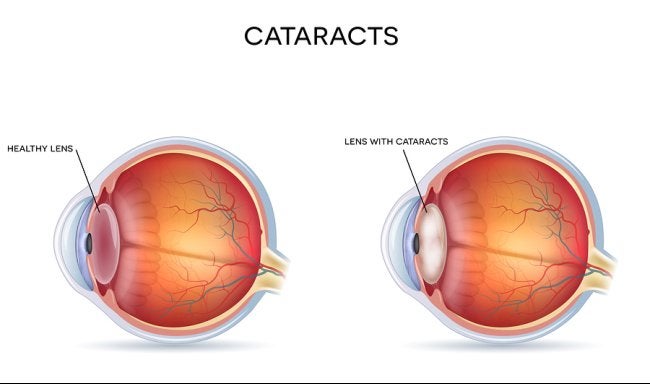Cataract Surgery in Derry & Surrounding Areas
Spindel Eye Associates Has Dedicated Cataract Surgeons on Staff
As you age, it is not uncommon to develop problems with your eyes. One issue you may encounter is a cataract, which causes cloudy or blurry vision and may impact your doctor’s ability to treat other eye problems like diabetic retinopathy or age-related macular degeneration. If you are suffering from cataract-related issues, cataract surgery may be necessary to remove your cloudy eye lens and replace it with a clear artificial lens. This type of surgery is performed on an outpatient basis and is among the most common and safest eye surgeries performed in the United States every year. If you need cataract surgery in the Derry, Windham, Londonderry, or Raymond, NH area, Spindel Eye Associates has you covered. Watch the video below for more information on how cataracts develop over time.
What Is a Cataract? What Are Common Cataract Symptoms?
Many people think of a cataract as being a film over the eye lens. However, a cataract is actually a clouding of the normally clear lens of the natural eye. Seeing through cataracts is a bit like looking through a frosty or fogged-up window. This clouded, blurry vision can make it difficult to drive, read, or even see the faces of your loved ones. Most cataracts develop slowly, but eventually, cataracts will start to interfere with your vision. The most common cataract symptoms include the following:
- Blurry vision
- Clouded or dim vision
- Need for brighter light for reading and other activities
- Changes in the way you see color
- Increasing difficulty with vision at night
- Seeing “halos” around lights
- Sensitivity to light and glare
- Double vision in a single eye
- Frequent changes in eyeglass or contact lens prescriptions
- Fading or yellowing of colors

What Usually Causes Cataracts?
The lens of the eye works like a camera lens, focusing light onto the retina for clear vision. The lens is made up of mostly water and protein. A cataract may start to form when age or injury causes the proteins to start clumping together and clouding small areas of the lens. Other possible causes include:
- Inherited genetic disorders
- Infection, injury, or poor development in the womb (congenital cataracts)
- Obesity
- Smoking
- Significant alcohol consumption
- Hypertension
- Previous eye surgery
- Medical conditions like diabetes
- Long-term steroid use
- Other eye problems
Short- and Long-Term Cataract Treatments and Solutions
When cataract symptoms start to appear, you may be able to improve your vision for a while using new glasses, bifocals, magnification, brighter lights, or other visual aids. As cataracts start to affect your everyday life negatively, you should talk to the experienced eye doctors at Spindel Eye Associates about the possibility of cataract surgery at one of our Southern New Hampshire clinics. This relatively painless surgery is highly successful, helping 9 out of 10 people regain very good vision. Cataract surgery costs are often covered by Medicare or private medical insurance but speak with your cataract doctor if you have any additional concerns or questions. We would be happy to go over financing and insurance options with you in greater detail during your consultation.
What to Expect During Cataract Surgery and Recovery?
Before your cataract surgery, we will conduct a comprehensive eye exam to evaluate your eye health. We will discuss any medications or supplements you take in relation to their chances of increasing your risk of complications. Most uncomplicated cataract surgeries take less than 15 minutes for experienced cataract surgeons to perform. However, you will likely spend 90 minutes or more at our office, counting surgery prep time and a thorough postoperative assessment with recovery instructions. Our eye doctors will go over all of your available premium lens implant options, including monofocal, multifocal, and toric intraocular lenses (IOLs), to determine which is best for your lifestyle, occupation, and eye health.
During cataract surgery, a small incision is made near the cornea. We use a tool to break up the cloudy eye lens into small pieces, which are then removed via gentle suction. Finally, we insert the artificial lens behind the pupil and iris. No stitches are required. If you require cataract surgery in both eyes, we may suggest two separate procedures spaced a few weeks apart. On the day of your surgery, you will need transportation. We may prescribe medicated eye drops and have you wear protective sunglasses or an eye shield to protect your eyes from bright lights and sunlight for the first few weeks. Eye redness and blurry vision are common while your eyes are healing. You will want to avoid strenuous activity and any infection-causing eye contaminants, including water while bathing or showering. We recommend refraining from swimming or sitting in a hot tub during cataract surgery recovery.
Schedule a Consultation With Our Cataract Surgeons Today
If you are interested in discussing the possibility of cataract surgery at one of our Southern New Hampshire clinics, please reach out to us today and request a consultation. We have locations in Derry, Windham, Londonderry, and Raymond, with weekend hours available for your convenience. Our cataract surgeons will help you determine if cataract surgery is the right option for your needs.
